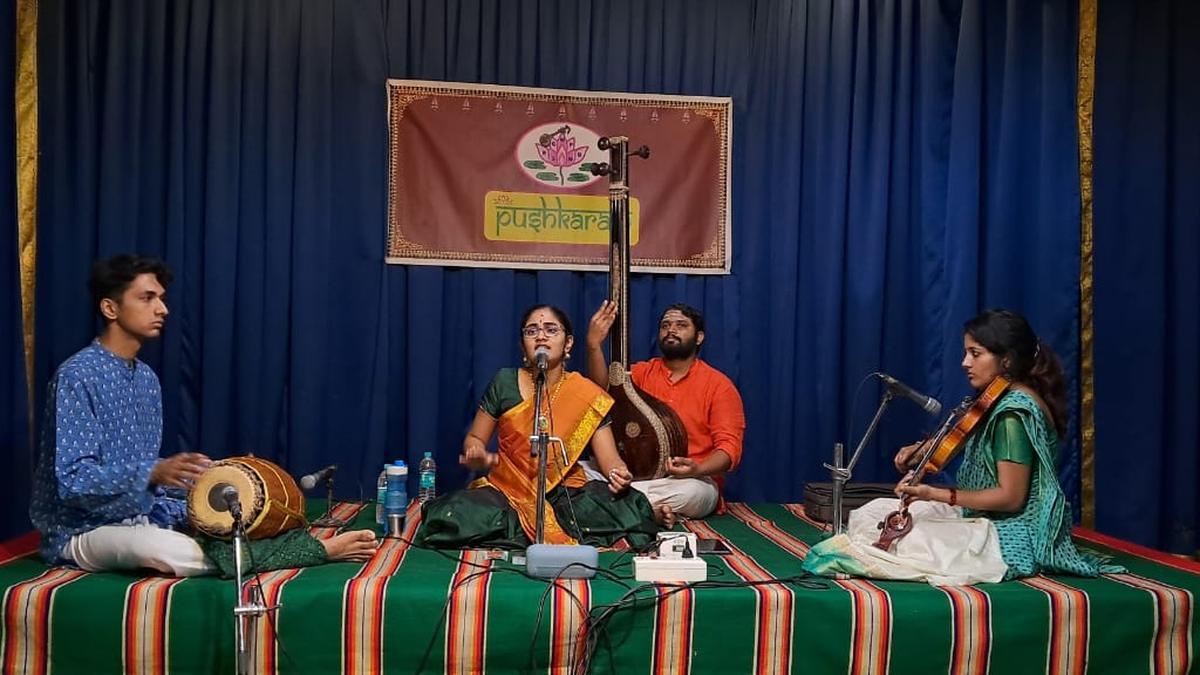
In an era dominated by technology, it’s heartening to witness the resurgence of the traditional guru-shishya parampara, where young artists are groomed under the watchful eyes of seasoned maestros. This was vividly illustrated during Nanditha Kannan’s recent vocal recital for the Pushkaram Trust. As I listened, it became evident that her mentor, the accomplished violinist R.K. Shriramkumar, had meticulously shaped her musical prowess.
The evening began on a high note with a comprehensive exploration of Kalyani, meticulously executed by Nanditha. This preceded one of Muthuswami Dikshitar’s masterpieces, ‘Bhajare re chittha balambikam’. The rendition was a testament to her rigorous training and artistic approach. Nanditha’s creative instincts shone brilliantly, especially during the Madhya Sthayi phrases. This particular composition, set in Misra Chapu tala and dedicated to the goddess at Vaithiswaran Koil, stood out as a highlight of the evening. It is noteworthy that this kriti is in the second Vibhakti and many of the names of Devi used by Dikshitar have their origins in the Lalitha Sahasranamam. The devotional essence of the kriti was eloquently brought to life during the niraval and swaraprastara at ‘Devim sakthi bijodbhava’.
Nanditha, who is a part of the musical lineage of Veena Sabesa Iyer, then delved into an alapana of Raga Begada. Her rendition encapsulated an old-world charm, effortlessly weaving complex melodic patterns to bring forth the raga’s quintessence. Following this, she performed the fourth of Dikshitar’s Tyagaraja Vibhakti kritis, ‘Tyagarajaya namaste’, rendering swaras at the pallavi.
The recital commenced traditionally with Tiruvotriyur Thiyagaiyer’s Sahana varnam ‘Karunimpa’. Nanditha’s subsequent rapid rendition of Tyagaraja’s ‘Vadera deivamu manasa’ in Panthuvarali was invigorating, with niraval and swaras at the third charanam, ‘Dhaatru vinutudaina’. Her portrayal demonstrated her versatile command over the Carnatic repertoire, bolstered by her intensive training.
Shifting to Raga Chintamani, Nanditha captured its inherent beauty and emotional depth. Syama Sastri, one of the celebrated Trinity composers, chose this raga for his work ‘Devi brova Samayamide’, and Nanditha did justice to its emotive potential.
. This was followed by an expressive rendition of Papanasam Sivan’s ‘Kumaran thaal paninthe thuthi’ in Yadukulakambhoji, displaying her adeptness at handling compositions across various ragas and composers.
The tukkada segment was equally impressive, showcasing Nanditha’s range and depth. It’s no surprise that she secured the first prize in the Thukkadas (vocal) category at The Hindu Margazhi Classical Music Competition in 2021. Her concert featured four pasurams, starting with ‘Maanikkam katti vayiram idai katti’ from the Periya Thirumozhi, presented in a Ragamalika of Neelambari, Kamas, Hamir Kalyani, and Suruti. Her nuanced treatment of the shabad ‘Thakur tum sharanahi aayo’ in Misra Nadai was evocative and reminiscent of M.S. Subbulakshmi, who frequently included this piece in her concerts.
Nanditha concluded her recital with two stirring pieces by Subramania Bharati, ‘Nenjukku neethiyum’ and ‘Bharatha dessmenru peyar solluvar’, closing an evening that was a rich tapestry of emotive and technical brilliance.
The concert was further elevated by the talented young accompanists. On the violin was C.S. Chinmayi, the daughter and disciple of C.N. Srinivasamurthy, a student of the violin maestro Lalgudi Jayaraman. Chinmayi proved herself to be an adept accompanist, complementing Nanditha’s performance impeccably. On the mridangam was the young and skilled A. Vamsidara, a disciple of Poongulam Ramakrishnan. His Thani in Misra Chapu, featuring Tisra nadai and a short chatusra-tisra combination, was executed with flair and matched the vocalist’s prowess seamlessly.
The collaboration of these young musicians resulted in a well-rounded and invigorating concert, reflecting the promising future of Carnatic music guided by the guru-shishya tradition. Friday Review












